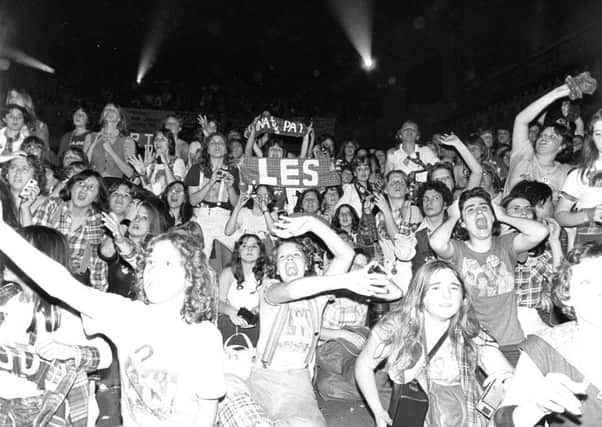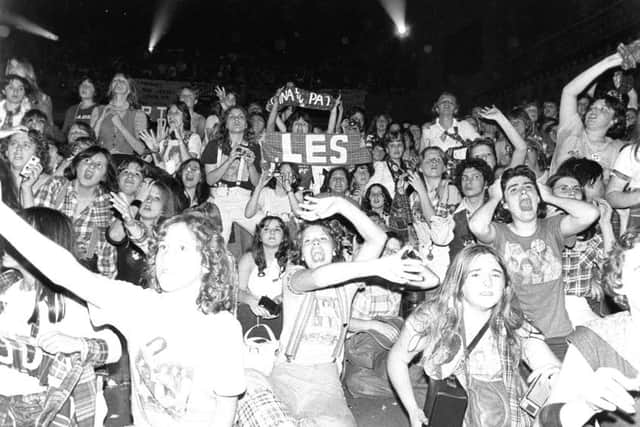Aidan Smith: Potato-faced pop idols deserve a break


The Rollers would never have been invited to join the Rolling Stones, the Who et al in Indio, California. From the first indecisive chord, from the first keelie warble, they lacked credibility. All the cool people thought them an embarrassment to Scotland. In terms of harm done to cultural image they were the equivalent of five William McGonagalls. They were a quintet of Ally MacLeods. They were Fran and Anna teamed up with the Krankies with Shughie McPhee from Crossroads on drums.
But consider this from John Peel, the DJ who was the arbiter of cool right through the 1970s: “I just thought: ‘If I live to be 200 years old I am never going to experience anything like this again. As a kind of cultural event, this is almost without parallel in our century.” Who was he talking about? Our toothsome Shang-a-Lang boys, no less, when they performed at a Radio 1 Fun Day.
Advertisement
Hide AdAdvertisement
Hide AdRod Stewart turned up for his investiture in a pair of tartan breeks – trademark clobber for the man many regard as a Scottish icon, not least those who earn their living from sales of tartan. But Stewart has never claimed to be Scottish; the Rollers are. Every date on their tours was Tartan Day; no one has done more to promote the plaid, even if thousands of teenybopper girls with checked scarves round their wrists and mad lust in their eyes maybe wasn’t the desired image.


Surely, though there is nothing which links the band whose most memorable lyric is “Doo-wop-be-doobie-doo-ay” with His Bobness? Well, in the pre-fame days the Rollers were a bit different. They covered songs by the cooler bands, Cream and Crosby, Stills & Nash. The driving force then was Davie Paton, who also introduced Dylan’s Positively 4th Street and The Times They Are a-Changin’ to the Rollers’ set. The reaction of the girls to lines like “Come writers and critics who prophesy with your pen” is not recorded but in any case, the band wore black sheer lace see-through shirts, inspired by a trip to Paris and knocked up by fellow Roller Nobby Clark on his mum’s sewing machine, so the girls probably weren’t listening to the words.
This Paton was a proper, serious musician, as evidenced by his later career, from the band Pilot onwards. The other Paton, Tam, the manager, preferred pop to rock, mayhem to expertise. “When there’s so much trouble, terrorists blowing up things, kids want entertained,” he told the New Musical Express. “They want to go to a concert where they can scream, wet their knickers and have a great time. Isn’t that what music’s really about?”
These words have been dug up by Simon Spence for his book The Dark History of the Bay City Rollers (Omnibus Press). You can imagine Simon Cowell saying them, can’t you? There’s a lot that Paton said and did in the early days that was conniving, manipulative – and if this was Brian Epstein, manager of the Beatles, we were talking about – brilliant. The book doesn’t scrimp on the dark, sordid, horrible stuff which emerged later and led to Paton being dubbed a monster.
Who knew the story would turn out so bad? Not me or anyone else who saw “Bay City Rollers” graffiti-ed on Edinburgh’s Waverley Steps and, in brief ignorance, didn’t know what one of them was. And, after Paton had got rid of the musos and recruited more wan boys, transforming the band into a half-mast-trousered threat to public order, my little sister didn’t know it either.


On a night this eminent professor of nursing is often teased about, she was dropped off by our mother at the cinema where she was supposedly meeting her friends – only for them to sprint across town and change into their Rollers-apeing outfits in a phone-box for the concert she’d been strictly forbidden from attending.
I was a big musical snob when Bye Bye Baby topped the charts but the Rollers were my sister’s idols so I didn’t sneer when Les or Woody or Eric – lads who started out being driven around in Paton’s potato lorry and rehearsing in his potato factory – paraded their potato faces on Lift Off with Ayshea. These were pan loaf faces, faces we knew, real, actual pop stars from our town, bringing their gormless grins and Clermiston accents to national television. What’s not to like?
My sister, demonstrating the perceptiveness she’d demonstrate in her career, was struck by how guitar leads popping out of the backs of instruments during the hysteria of the show didn’t bring the music to a juddering halt. The Rollers were dogged by jibes about them not having played on their biggest hits while the Monkees never suffered like that.
Advertisement
Hide AdAdvertisement
Hide AdThe Rollers were dogged often. They became a national joke, a cringe-inducing expression of Scottishness like Brigadoon and were blamed, along with our footballers after the Argentina World Cup debacle, of causing a nation contemplating independence to lose its nerve. Hang on, they wailed, we’re just a daft pop band! And then they got ripped off.
The book, together with a recent TV tribute and play, is causing us to think again about their daft pop music – the best kind – and the band have reformed and are cashing in. Good luck to them.